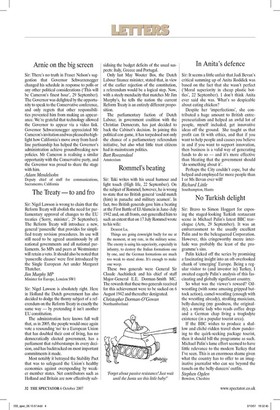The Treaty — to and fro
Sir: Nigel Lawson is wrong to claim that the Reform Treaty will abolish the need for parliamentary approval of changes to the EU treaties (Sorry, minister', 29 September). The Reform Treaty will introduce a new, general `passerelle' that provides for simplified treaty revision procedures. Its use will still need to be agreed unanimously by all national governments and all national parliaments. So MPs and peers at Westminster will retain a veto. It should also be noted that `passerelle clauses' were first introduced by the Single European Act under Margaret Thatcher.
Tim Muiphy MP Minister for Europe, London SW1 Sir: Nigel Lawson is absolutely right. Here in Holland the Dutch government has also decided to dodge the thorny subject of a referendum on the Reform Treaty in exactly the same way — by pretending it isn't another EU constitution.
The administration here knows full well that, as in 2005, the people would once again vote a resounding 'no' to a European Union that has doubled their cost of living, has no democratically elected government, has a parliament that rubberstamps its every decision, and has backtracked on most important commitments it made.
Most notably it betrayed the Stability Pact that was to safeguard the Union's healthy economies against overspending by weaker member states. Net contributors such as Holland and Britain are now effectively subsidising the budget deficits of the usual suspects: Italy, Greece and Portugal.
Only last May Wouter Bos, the Dutch Labour finance minister, stated that, in view of the earlier rejection of the constitution, a referendum would be a logical step. Now, with a steely mendacity that matches Mr Jim Murphy's, he tells the nation the current Reform Treaty is an entirely different proposition.
The parliamentary faction of Dutch Labour, in government coalition with the Christian Democrats, has just decided to back the Cabinet's decision. In joining this political con game, it has torpedoed not only the chance of a parliamentary referendum initiative, but also what little trust citizens had in mainstream politics.
Bart Roozendaal Amsterdam





























































 Previous page
Previous page